|
This is the first time in BSOSpirit that we perform this kind of two-sided interview. And, according to the results, we should consider this again in the future.
Mike Reagan is one of the most talented and versatile composers working today. His scores for videogames, TV shows, and films have been nationally recognized with some of the most prestigious industry awards. When he's not pulling all-nighters in his studio, you can usually find him at one of those biker bars that stretch along any number of dark and desolate highways, if you're so bold.
On the other hand, Cris Velasco is one of the most talented composers in the business. His videogame scores are powerful and passionate. The heroes he scores for are hypermusculate guys that have people like you for breakfast. And maybe Cris is not very different from these action heroes.
Shut down your mobile phones, send your couple go shopping, and pay full attention to these two Gods of Wars in videogames world.
 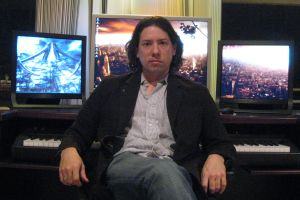
BSOSpirit: Let us start with one of the typical questions we ask every composer we interview: when did you first get interested in music for the audiovisual media?
Mike Reagan: Watching Close Encounters of the Third Kind, and the original Star Wars movies was a huge inspiration. The music was such an important part of those stories, but I had no idea what was involved in creating it. When I started composing music for video games and commercials in the late-90’s I began dissecting what my heroes at the time were doing.
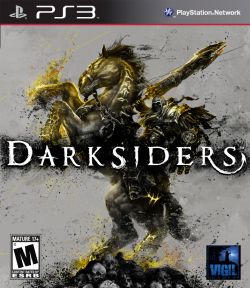 Cris Velasco: I’ve been an avid gamer since Space Invaders hit Atari in 1980; however, I never really considered writing music for games as a career until I had recently graduated from the music composition program at UCLA. Cris Velasco: I’ve been an avid gamer since Space Invaders hit Atari in 1980; however, I never really considered writing music for games as a career until I had recently graduated from the music composition program at UCLA.
When I was done with school I wanted to write the kind of epic orchestral scores that I fell in love with from the movies. At that point, I hadn’t really heard anything in games that led me to believe that this was a viable path.
But a few months later I heard the score to Outcast by my (now) good friend Lennie Moore and I realized that games could offer me the creative outlet that I was looking for. Now I am able to really fulfill my dream as a composer. Not only do I get to write the kind of music that inspires me, but I also get to record with amazing orchestras and choirs around the world.
BS: You both are clearly used to working together. However, for us fans it’s rather difficult to differentiate which part of the final score was written by whom. How do you do it? Is one of you focusing more on orchestrating the actual score and the other one in the programming aspect or do you rather share all the creative stages?
MR: Cris and I wrote the Darksiders Main Title Theme together, and then we divided and conquered to complete the remaining tracks. I think that by brainstorming and creating the main theme together allowed us to work independently and remain true to the esthetic.
CV: The majority of the score was divided up between the two of us so we were each responsible for the entirety of our own tracks. Most of the cues were made up of orchestra, choir, percussion, and a few soloists. The only exception was the Darksiders Main Theme which we co-composed. Since we both come from an orchestral background, all of our ideas and arguments in regards to the Theme were settled the same way: arm wrestling.

BS: Mike’s role as a sound editor in movies such as Black Hawk Down", "Godzilla" or "Face/Off". is further know to us. What differences do you see between working for films and videogames?
MR: I think that writing music for games requires a bit more patience and understanding of the technical side of things. While it’s true that gamers expect the same quality as a feature film score, the game experience can benefit greatly from music composed and prepared specifically for a game.
You have to not only imagine what the music will feel like when you’re playing the game, but you have to actually play the game to find out if your instincts were correct. You have to play games in general to know what works and what doesn’t work, and find things that will both inspire you and to teach you what you will do differently on the next game project. Nothing beats playing through 20 hours of game play per title to recognize what works and what doesn’t.
BS: Cris, you’ve participated in a good number of scores for videogames which are rather based on films o created by people who have a well-established career in film business like John Woo’s "Stranglehold" or Clive Barker‘s "Jericho". Do you feel there are more creative restrictions when working on the former projects than, say, on "Haze" or "Prototype" which do not have previous to previous characters or story-lines?
CV: I’ve never felt any creative restrictions at all on any game really. Stranglehold and Jericho were both original IP’s so there was nothing to really model the music after. Clive Barker and John Woo both had ideas of how the music should sound but I never felt restricted at all. Same goes with the movie based games like Beowulf, TMNT or G.I. Joe. Those games were in development at the same time as the film. Usually in that case, I’m writing music at the same time (or before) the film composer starts working, so my score remains unique to the game.
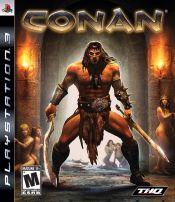 BS: Mike, we are particularly fond of your score for the videogame "Conan". This character is very special for us, among other things, after the wonderful experience we had with the amazing Basil Poledouris in his only live performance ever of said score in the context of the Úbeda Film Music Festival that we organize. Did you have his legendary score in mind when writing your own? BS: Mike, we are particularly fond of your score for the videogame "Conan". This character is very special for us, among other things, after the wonderful experience we had with the amazing Basil Poledouris in his only live performance ever of said score in the context of the Úbeda Film Music Festival that we organize. Did you have his legendary score in mind when writing your own?
MR: Yep – and that’s what drove me to redo certain cues without any such request from the client. It’s what drove me to hire Emil Richards, Denny Siewell and Mike Duffy to play live percussion, and Asdru Sierra and Ron Blake to play the trumpet parts. When one of the masters like Basil Poledouris sets the bar for such a moving score, you can’t help but second guess your choices and ask if it holds up. There are still several requests for an official Conan soundtrack, which I’d love to see happen.
BS: How did you two meet? Was it because of “God of War”?
MR: I met Cris on a dark and desolate highway in a biker bar on the way to Vegas. “Are those snakeskin?” he said. “No,” I replied. “They’re Hanes.” We’ve been dodging the tabloids ever since. Oh no, wait… it was on the Van Helsing game.
CV: I actually met Mike for the first time in Seattle at the recording session for Van Helsing. I thought that he was perhaps homeless and had wandered into the session to stay warm and steal our coffee. Turns out he was actually a composer! I still feel bad for having the security guard give him such a rigorous beating.
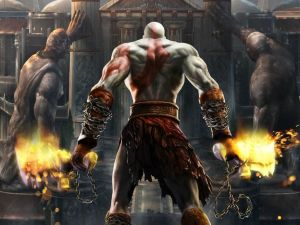 BS: We guess that being attached to a laureate franchise like “God of War” must have changed your lives a little bit. Possibly it feels a little like being the actor chosen for James Bond… a little pigeonholed in spite of working in other areas. Do you think working on “God of War” is a privilege or are you starting to feel tired about this label? BS: We guess that being attached to a laureate franchise like “God of War” must have changed your lives a little bit. Possibly it feels a little like being the actor chosen for James Bond… a little pigeonholed in spite of working in other areas. Do you think working on “God of War” is a privilege or are you starting to feel tired about this label?
MR: It’s an absolute privilege to be associated with the God of War series, and it caught the attention of Victor Rodriguez and the team at Vigil as well. I think you definitely get known for writing a particular type of music when a project explodes the way we expect Darksiders to.
I get these emails from fans who are shocked when they learn that I also scored the Wow Wow Wubbzy and Ape Escape cartoons on the Nickelodeon channels – so I think continuing to create a diverse catalogue of music helps rip that pigeon out of his hole with a THUNK. I love creating all types of music, and fortunately THQ and Vigil have the foresight to believe in people and their talent.
CV: God of War has been a bit of a double-edged sword I suppose. You’re right about being sometimes pigeonholed in this style. I get asked to replicate the God of War sound all the time. Almost always though, I’m able to convince these developers to try experimenting with their own unique style. I also have made it a point to search out projects that allow me to try numerous styles as well. Borderlands, Prototype, Haze, Jericho, Mortal Kombat vs. DC Universe, etc. are nothing at all like God of War. However, being on the composing team for God of War has helped my career out immensely as well. It never hurts to be on a best selling, award winning title! God of War is also where I met Victor Rodriguez, the now music director for THQ. Not only are we great friends but he’s the one who recommended Mike and I to score Darksiders.
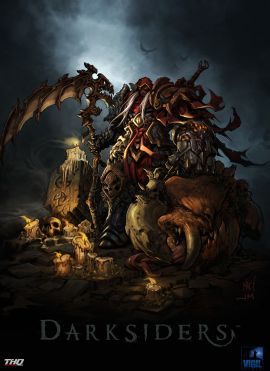 BS: How did you get involved in "Darksiders"? BS: How did you get involved in "Darksiders"?
MR: Cris and I each got a phone call from Victor Rodriguez at THQ.
CV: Mike and I were approached by Victor Rodriguez last year. A score for Darksiders had already been written and recorded, but the guys at THQ and Vigil felt like it wasn’t fitting in exactly the way they’d hoped. So we were asked to come on board and replace most of the music with something that was more suited for a AAA title of this caliber.
BS: Renown illustrator and comic writer Joe Madureira is the creative mind behind "Darksiders". Did he throw in any ideas that influenced your music or did he never get to meet you?
MR: I think the question is did we ever get to meet him! Joe is a legend, and it’s a trip to be able to work with him on Darksiders. He definitely had an esthetic he was looking for and also not looking for. Being able to view artwork and gameplay got the juices flowing and really inspired us to find a compliment musically. We took meetings with Joe Mad and Jeremy Robins over the phone and had a chance to hang with Jeremy at Skywalker Sound for the choir sessions – still hope to meet Joe in person.
CV: We didn’t have any direct contact with Joe Mad. Jeremy Robins is the audio director at Vigil and we worked very closely with him to develop a signature sound for Darksiders. However, Joe’s amazing art style for the game was definitely a direct influence on the overall score. Hopefully, we’ll get to meet him soon. I’d love a Joe Mad original Darksiders sketch for my studio!
BS: When playing it’s interesting the contrast you achieve between the visuals of the game (very closer o a comic book) and more sober music approach you take rather closer to the film world. One would initially expect a more exaggerated score. Did you consciously choose this approach?
MR: We knew early on that we didn’t want to bombard the listener with too many layers. There were times where this was appropriate, but the visual stimulation was so cool that you don’t need a score that screams “YOU’RE FIGHTING NOW!”. The story, art and gameplay do that just fine, and we feel our job is to support those elements.
CV: It does seem like the more over-the-top the game and visuals are, the bigger and more exaggerated the music should be. But not going that route was a conscious decision. We felt that it would tend to overwhelm the players. And even though the visuals and gameplay are quite exciting, the overall story is still a pretty grim one. We just felt that the music should support what’s happening but still maintain a somewhat somber tone to address the predicament that War finds himself in.
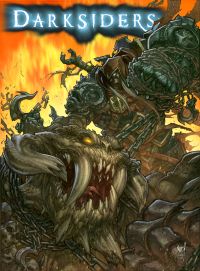 BS: Let’s talk a little bit about the writing process here: instrumentation, use of the choir and main goals pursued. BS: Let’s talk a little bit about the writing process here: instrumentation, use of the choir and main goals pursued.
CV: The score features a fairly traditional instrumentation of orchestra, percussion and choir. However, we wrote it in a way that (hopefully) distinguishes it from other titles. For instance, the choir is used in a more hymn-like way rather than just being there to crank things up to 11. We wanted to pay homage to the religious nature of the story. That’s also why we brought in a boy soprano to sing with the choir. It’s such a pure and sweet tone that can’t be replicated by anything else. It also has a very mass-like quality to it that seemed apt for a story about the apocalypse.
BS: How is it the experience to record in Skywalker Sound Studios?
CV: Skywalker was a blast. Recording with Leslie Ann Jones and her team is a seamless and rewarding process that every composer should experience. I spent a total of 2 weeks up there last year between a couple different projects and let me tell you, you just don’t want to leave that place… I think George Lucas created an actual fantasy island, but couldn’t convince Marin County to put miles of water around it. Some big holdup about taking out the 101 freeway. Red tape sucks.
BS: I think that Cris did further try this studio when he recorded his powerful score for "Prototype" along with Sascha Dikiciyan. Is that right?
CV: The score for Darksiders was my 8th (I think) time to record at Skywalker. I’m proud to say that after my first session there a few years ago for Beowulf, I’ve never recorded an orchestra anywhere else. It’s an amazing experience to record there with some of the best musicians in the world. I’ve kept the same team assembled for every session as well: Leslie Jones as engineer, Andre Zweers on Protools, Janet Ketchum as contractor, Erin Collins as score supervisor and Tim Davies as my orchestrator and conductor. We’re really getting good at working together and each subsequent score recorded at Skywalker just keeps sounding better and better.
BS: Will THQ release the score anytime in the future?
MR: We certainly hope so.
CV: There was some talk of releasing the score but we haven’t heard a final decision yet. I hope it will come out though!
BS: Cris, "Borderlands" is out now. Can you tell us a bit about your score for this game which has been released by Sumthing Else Music Works?
CV: I worked on Borderlands with Sascha Dikiciyan. Our score was used mainly for combat and combined mostly percussion with electronics. There’s orchestra in there too but it’s used sparingly. We also used a great solo instrument called the guitarviol. It gave te score a very alien and desolate sound that was perfect for the setting of Borderlands.
 BS: Mike, how do you go from writing kids' songs in film (Elmo in Grouchland - Grammy Award winning soundtrack) to games about death (GOW, Conan, Darksiders), to kids' cartoons (Ape Escape, Wow Wow Wubbzy), to romantic comedy feature films (Unbeatable Harold)? BS: Mike, how do you go from writing kids' songs in film (Elmo in Grouchland - Grammy Award winning soundtrack) to games about death (GOW, Conan, Darksiders), to kids' cartoons (Ape Escape, Wow Wow Wubbzy), to romantic comedy feature films (Unbeatable Harold)?
MR: The last few years have been a life lesson in organization for me. Moving between different projects is actually a good thing because it keeps things moving and ideas fresh. The main challenge isn’t the flow of ideas, but rather making sure there’s a rock solid studio on the technical side and that the workflow is organized. I love so many different genres of music, and it’s a joy to be able to work on a wide variety of projects.
BS: Just to close this interview, could you please let us know what future projects you are involved in?
MR: Unfortunately I’m unable to speak about the projects slated for this year, but I’m excited about 2010 for sure. Stay tuned!
CV: I’m involved on a couple more huge game titles with Sascha Dikiciyan at the moment. Unfortunately, I can’t really go into details right now. I’m also developing my own brand of cologne for hardcore gamers called God of (W)aroma :)
Interview by David Doncel
English Version by Sergio Gorjón
Thanks to Greg O´Connor and David Saiz
| 




